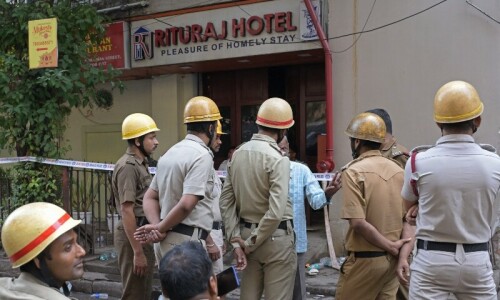WASHINGTON: With the Foreign Office saying it was verifying reports about the militant Islamic State group’s claim that it had carried out attack on the Pakistan Embassy in Kabul, an official US report to Congress doubts the Afghan Taliban’s ability to counter IS.
“Independently and in consultation with the Afghan authorities, we are verifying the veracity of these reports,” the FO spokesperson said in a statement on Sunday, adding the attack was a reminder of the risk militant activity posed to the region.
“We must act resolutely with all our collective might to defeat this menace. On its part, Pakistan remains steadfast in its commitment to combat terrorism,” the FO official said.
Islamic State-Khorasan Province, which claimed the attack, is affiliated with the Islamic State in the Middle East.
US doubts Afghan Taliban’s ability to counter IS
IS claimed the attack was carried out by two of its members armed with “medium and sniper weapons” and was targeting the ambassador and his guards who were present in the courtyard of the embassy, according to Reuters.
US report
Meanwhile, an official US report to Congress has expressed doubts about the Taliban’s ability to counter IS.
“Experts disagree about the potency of the ISKP threat and the Taliban’s self-asserted ability to counter the group without external assistance,” says the report sent this week to Congress by the Congressional Research Service (CRS).
“An arguably more potent armed threat to the Taliban is the local Islamic State affiliate ISKP, a longtime Taliban adversary,” the CRS report adds.
It points out that the ISKP has opposed the Taliban since its 2015 establishment, viewing the Taliban’s Afghanistan-focused nationalist political project as counter to IS’s universalist vision of a global caliphate.
According to the CRS, since the Taliban takeover of Kabul in August 2021, “ISKP’s ranks have swelled to as many as 4,000 fighters despite a concerted Taliban offensive, and ISKP has claimed responsibility for a number of major attacks in 2022” inside Afghanistan.
CRS is a Washington-based, congressional think-tank which serves as nonpartisan shared staff to congressional committees and members of both the House and the Senate. It operates solely at the behest of and under the direction of Congress.
On Friday, the Pakistan Embassy in Kabul came under attack with Chargé d’Affaires to Afghanistan Ubaidur Rehman Nizamani being targeted. Mr Nizamani was unscathed but his guard was critically wounded.
The CRS report also examines how regional dynamics of neighbouring states directly affect developments in Afghanistan and how “events in Afghanistan have consequences for the neighbours” as well.
The report regards Pakistan as the “most important” neighbour for Afghanistan, which “has played an active, and by many accounts destabilising, role in Afghan affairs for decades, including by actively supporting the Taliban during its 1990s rule and much of its subsequent insurgency.”
The report points out that many analysts regarded “the Taliban takeover, at least initially, as a triumph for Pakistan’s regional policy,” pointing to statements of evident support for the takeover from Pakistani leaders.
But the report also underlines recent “indications that the Taliban’s return to power may pose challenges for Pakistan”.
It cautions that the Taliban’s victory “may provide a morale and perhaps material boost to Pakistan-based terrorist groups, including the banned Tehreek-i-Taliban Pakistan (TTP), which is a US-designated foreign terrorist organisation.
“TTP attacks against Pakistani security forces increased after August 2021, reportedly prompting the Pakistani government to seek the Afghan Taliban’s mediation of several ceasefires, which appear to have broken down in late 2022,” the report adds.
The Congressional Research Service notes that Afghanistan-Pakistan relations “are further complicated by the presence of over 1 million Afghan refugees in Pakistan, as well as a long-running and ethnically tinged dispute over their shared long border, at which Taliban and Pakistani government forces intermittently clashed in 2022.
Published in Dawn, December 5th, 2022













































